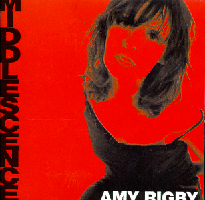
Amy Rigby
Middlescence (Koch)
by Marc Hirsh

Amy Rigby
Middlescence (Koch)
by Marc Hirsh
originally published in Space City Rock, Fall 1999
"They say that middle age is really the beginning of life... I don't know if I buy that."
And so, with the last line of "Invisible" (which is kind of like Mary-Chapin Carpenter's "I Feel Lucky" gone horribly, horribly wrong), Amy Rigby goes ahead and explicitly states the underlying theme of both Middlescence and her solo debut, Diary of a Mod Housewife (go on and buy it now, I'll wait). It's a fairly devastating end to the record (not counting an unlisted song about getting moist for an unnamed drummer, which is funny, charming and totally out of character with the rest of the album, which is probably why it's not on the official track listing), and it's not like the rest of it has pulled any punches. This is probably the most starkly realistic album about relationships (rather than love) since Voice of the Beehive's Let It Bee (or maybe even Talk Show by the Go-Go's).
What makes Rigby worth your attention is that she's not only hurt, she's angry, but not I-hate-you angry. Rigby's pique is more internal and inquisitive. The angriest she gets is in the zippy pub-rock of "Raising The Bar," where she rails against whatever it is (never identified, and good for her) that makes frustration the natural result of well-intentioned effort. Otherwise, she finds more subtle ways of voicing her little agonies, as in the internal dialogue of "What I Need," which captures in 4 minutes exactly what Helen Hunt failed to deliver in 2 1/2 hours of As Good As It Gets (same character, different interpretation). She's driven by a sense of romance (and lust, too, although the only time the word "sex" even comes up, she has to whisper it) so strong that when she's forced to throw up walls, either literally in "Ivory Tower" ("You can't hurt what you can't touch") or just metaphorically as in "Laboratory of Love" ("I no longer want to continue testing my emotions"), she gets irked that she even has to consider swimming upstream against her natural tendencies to embrace emotions that lead to trouble. If you're listening to "As Is" for at least the second time and you still think it's about thrift shopping, you're not paying attention.
If there are any missteps here, they rest squarely on the shoulders of the music. A few cuts here recall the jangle-pop and light country sound of Mod Housewife; the best of these is "The Summer of My Wasted Youth," which pulls in all directions on a Nashville sound until the resultant noise leans toward the ethereal. The rest, however, suffer from an infuriating tendency to try as many different styles as possible. I tend to blame returning producer Elliot Easton (late of the Cars), but it's most likely both his and Rigby's fault. As a result, the album springs to glorious life with "All I Want" (a noisy recreation of either classic '60s girl-group pop or Rosanne Cash's MTV period, which is the same thing), veers its way towards N'Orleans piano funk (the meandering "Calling Professor Longhair," a rare flat-out mistake), thinks it's Cat Stevens for a sec ("As Is") and even finds time for a little bossa nova ("Laboratory of Love," which, to be fair, works pretty well, though that may just be the theremin talking). A few of the sonic touches that call attention to themselves do acquit themselves nicely, such as the "Dear Prudence" bass in "20th Anniversary" and the whole of "Ivory Tower" (which is basically one extended, ever-increasing climax), but on the whole, there's a severe lack of focus in the music that threatens to undermine the lyrics on several occasions but never quite does.
Doesn't matter. This may be the most flawed great album I've ever heard, but that just makes me love it more. Rigby's lyrics explore themes that are barely referred to, let alone explored, in anybody else's music. Even the packaging does her up right. Check out the front cover. Sexy. Assured. Ready for anything. It's not until after you've opened up the CD that you find another picture of Ms. Rigby inside. Only this one makes her look like a little girl. Scared. Vulnerable. Wide-eyed. Sometimes you take your metaphors where you find them.